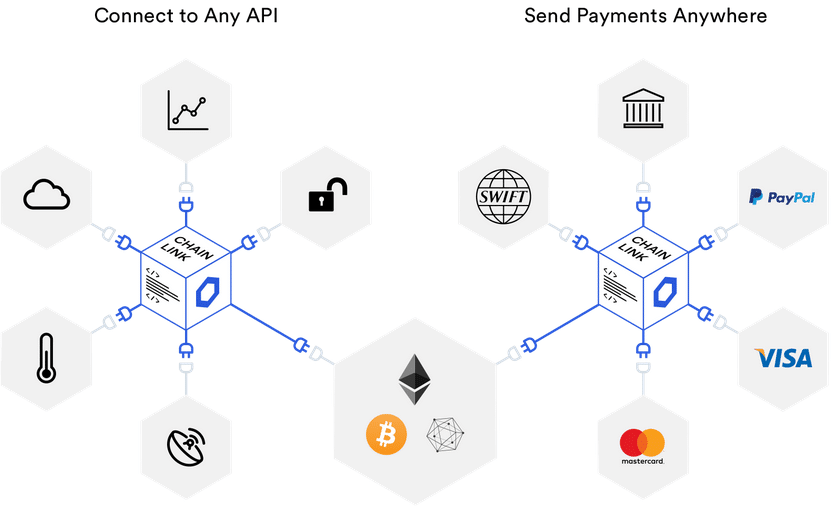Chainlink seeks to extend the blockchain to large companies on different levels. Here is a guide on the most used data oracle on the blockchain.
Smart contracts offer the ability to execute digital agreements in a trustless, secure and reliable way. In order to maintain the overall reliability of a smart contract, the data on which smart contracts are based must be secure and guaranteed against tampering. Chainlink solves the so-called “oracle problem” and provides a reliable and secure end-to-end connection to external data for any blockchain.
In fact, even though LINK is a token based on Ethereum, it is basically only used to pay node operators to guarantee data reliability.
Chainlink Guide
The Chainlink oracle can be integrated into any platform by adding an external interface plugin so that it can retrieve Chainlink data or distribute Chainlink contracts on the blockchain. This more complex method has already been successfully implemented on Hedera Hashgraph, IOTA, Zilliqa and Polkadot.
Chainlink guarantees sufficient decentralization thanks to the network of oracles managed by different node operators, who are encouraged to provide adequate data, selected from different sources to guarantee maximum reliability. The Chainlink nodes themselves are chosen based on their reputation, providing additional security to the system.
Mixicles and DeFi for large enterprises
Chainlink is not only bringing real-world data to the smart contracts of the different blockchains but is trying to bring decentralized finance (DeFi) to companies and large corporations.
One of the biggest limits to the adoption of DeFi on Ethereum by large corporations is the lack of privacy. All operations are publicly visible and this severely limits their use for business applications. Companies must, in fact, keep their business strategies and positions private, not only for strategic issues but also for legal issues, for example, to avoid the practice of front running.
Chainlink’s Mixicles combines the concept of a decentralized oracle with that of a mixer. In addition to providing data to and from the real world, state changes are mixed in such a way that no association is possible for an external observer.

To do this, Mixicles redefines smart contracts by dividing them into two parts, on-chain and off-chain, which have no connection to each other except for Chainlink’s oracle which operates privately.
Mixicles can thus provide confidentiality in payments, hiding the identities of recipients by using pseudonymous bits to indicate addresses on the blockchain. Mixicles’ smart contract distributes pool funds based on Chainlink’s oracle network reports, obfuscating the related external event. Instead of using a random function like traditional mixers, this system makes the pools more suitable for use as traditional financial instruments, such as derivatives and binary options.
This system also promotes oracle anonymization, which makes Chainlink’s network even more resilient to attacks. It becomes impossible for any malicious actor to find out which smart contract is the most profitable or which node to attack to manipulate data. A plausible scenario if in the future the cost to attack a node or bribe an oracle would be less than the profit.
Like all mixers, Mixicles works best when multiple users are involved in a mix, which is an interesting factor for an extremely large derivatives market. At the same time, Mixicles strives to comply with current anti-money laundering and anti-terrorism regulations, making oracle reports verifiable by third parties. In practice, Chainlink would allow authorities to monitor transactions, under certain circumstances, by disclosing the content of its smart contracts. However, this introduces doubts about Chainlink’s central role and the confidentiality of Mixicles.
Mixicles’ smart contract has been under audit for a few months now and there is no definite news about its release on the mainnet.
The adoption of Ethereum by companies and the role of Chainlink
Last January Consensys set up a task force called EMINENT (Ethereum Mainnet Integration for Enterprises), focused on the standards and specifications used to integrate Ethereum Mainnet with ERP and CRM systems, as well as other enterprise registration software.
ERP (Enterprise Resource Planning) and CRM (Customer Relationship Management) systems constitute a set of planning, scheduling and forecasting tools whose objective is to improve the decision-making process for all those involved, from the producer to the customer. The integration of the Ethereum blockchain with these management tools would allow companies and large enterprises to enter the world of distributed ledgers, with all the advantages that this entails.
The EMINENT task force is composed of Chainlink, Unibright, Anyblock Analytics and others, and its goal is to build implementations and reference guidelines available as open-source code for the integration of the Ethereum mainnet with corporate ERP systems.
Chainlink also actively participates in the Technical Steering Committee (TSC) of Baseline Protocol, the open-source initiative that aims to provide secure, private business processes on the Ethereum blockchain. Baseline Protocol has been created by Consensys and Ernst & Young with the participation of Microsoft and will enable confidential and complex collaboration between companies, supporting tokenisation and DeFi without revealing sensitive business assets or activities to unauthorized parties.




